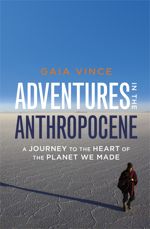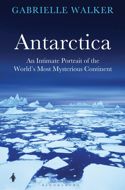 Science journalist Gaia Vince left her desk at Nature and spent two years visiting places around the world, some of them very isolated, where people were grappling with the conditions of what is sometimes described as a new epoch, the Anthropocene. It dates from the industrial revolution and represents a different world from the relatively settled Holocene in which human civilisation was able to develop. Adventures in the Anthropocene tells the story of Vince’s encounters with some remarkable individuals and their communities. It also includes lengthy musings on the technologies the future may employ as humanity faces the challenges of climate change, ocean acidification, population growth, resource depletion and more.
Science journalist Gaia Vince left her desk at Nature and spent two years visiting places around the world, some of them very isolated, where people were grappling with the conditions of what is sometimes described as a new epoch, the Anthropocene. It dates from the industrial revolution and represents a different world from the relatively settled Holocene in which human civilisation was able to develop. Adventures in the Anthropocene tells the story of Vince’s encounters with some remarkable individuals and their communities. It also includes lengthy musings on the technologies the future may employ as humanity faces the challenges of climate change, ocean acidification, population growth, resource depletion and more.
Vince goes to the front lines of the human battles. In a remote village in Nepal she describes the extraordinary work of Mahabir Pun who gained a university scholarship in the US and returned years later to bring computers and Wi-Fi to the children of his village. It’s a fascinating story, full of hope for development in his region. But it’s also precarious. Electricity for the computers comes from a small hydro-scheme fed by glacier water. In the same chapter Vince points out that the warming rate in that Himalayan region is five times greater than the global average and the glaciers are melting. Once they are gone there is no meltwater and no power. Levels have already been diminishing in the once-deep stream near the village.

 In his
In his  Science journalist
Science journalist  Science historians Naomi Oreskes and Erik Conway, co-authors of the acclaimed
Science historians Naomi Oreskes and Erik Conway, co-authors of the acclaimed  Al Gore has written an impressive
Al Gore has written an impressive